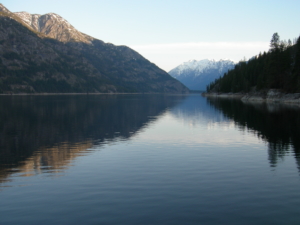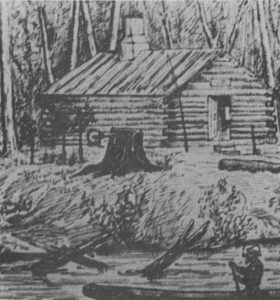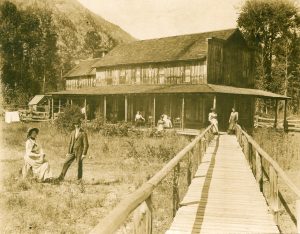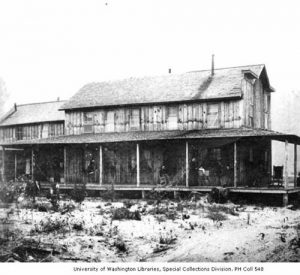The Pioneer Story
This story was written by Mrs. Belle Hall Laroux, oldest daughter of George Hall, granddaughter of John W. Horton, first settler of Stehekin. Mr. Horton was also known as “Major Twisp.” George Hall brought his family from Minneapolis to Stehekin in 1890.
Mrs. Laroux’s home at the present time is in Healdsburg, Calif. In her recent trip to Chelan she was accompanied by Mrs. Nella Brink, sister of Mrs. Laroux, who is mentioned many times in the story. Due to the length of this story it will run in the next eight issues of the Chelan Valley Mirror.
*** Part One ***
At long, long last, her I am where I have longed with all my heart to be for many, many years. I am sitting at the window of a little summer cabin, looking out upon the snow. Tall Douglas Firs stand before the door, thickets of Maple Trees, bare of leaf, stately cedars, with their fern-like branches, sprinkled over with snow, across the valley, and, above all, towering, rugged, snow-covered mountains.
Tomorrow, if it does not snow too much, I am to try to find my grandfather’s old cabin. They say it is still here, but requires a struggle through snow and brush to find it.
Today I came up the lake by launch, a trip of four and one-half hours. Not for one single minute did I take my eyes from the gorgeous, indescribable beauty of those towering peaks, except when I looked at their shadows in the depths of the clear, bottomless lake. I can’t believe that I am here again at Stehekin. Stehekin, source of the dearest and happiest memories of my childhood days, the place of a thousand dreams. Will I wake up now and find it still a dream?
I can see my dear old grandfather, as if it were only yesterday, and I remember so well how we children used to climb on his lap and braid his whiskers and tie them in 2 or 3 braids with ribbons, and how we waited only for a tree that we was felling to hit the ground, to run along its trunk like squirrels, crashing through the branches, smelling the heavenly odor of crushed cedar or fir. How we used to watch him in his cabin frying salt pork and potatoes, and making his hunger-satisfying bannock; this he made by opening his sack of flour, rolling back the top, scooping a round bowl in its snowy depths, sprinkling over the flour a little salt and soda, and pouring in a foamy batter from an old lard pail, stirring this into a stiff dough, then deftly rolling, mixing and breaking off fluffy chunks and patting it out in a greased frying pan, making a hole in the center. He then propped this before the fireplace with a stick and a handle to hold it up straight. Then skillfully flipping it over as each side was browned, and sometimes, just to please us children, he would toss it up in the air, catching it neatly in the pan, and then when all was done, he would say, “grab a root.” Down we would sit at his little table and would gorge ourselves with food, wash it down with coffee and condensed milk, which we were not permitted to have at home.
86-87 John Horton, a prospector, settled at the mouth of the Stehekin River. A few years later he moved to a cabin hear present day Castle.
Stehekin Valley Chronology, Carol Stone
I remember how we used to go to his garden and pull and eat raw, the tiny, sweet turnips, radishes and young onions, and chew all day on strips of dried venison (jerky).
How good and kind he was to us all, never scolding, and gently rebuking when we were very bad that never again did we offend in the same way. I remember the lovely, beaded, buckskin gloves he made for us and the fine moccasins. How well I remember the first Christmas. We girls had only a rag doll apiece that our mother had made, with eyes, nose, and mouth done with a pencil, and the dear little beds grandpa made for them, with willow branches. The dolls were tucked in these beds covered with squares of white cloth, and all around the most delicious doughnut dolls, dogs and cats that grandpa made, and how wildly happy we were. No child of mine, in later years, whose Christmas was a mad riot of expensive dolls, dishes, mechanical toys and Christmas trees with store ornaments, and loads of sweets, ever knew one minute of the exquisite happiness the simple things we had here brought us.
Dear, dear Grandpa, these last twenty years he has rested in an honored soldier’s grave. We children worshipped him, and my own children loved him no less.
It has been just forty-seven years since I saw this place last, and even then, I recognized familiar spots, even though the surroundings made by man are completely changed. I saw where my mother would shove her rowboat out into the lake, and trolling her line behind, caught enough rainbow trout in half an hour to feed a crew of men, who were here. At the time my father had them cutting logs. My mother, raven-haired, black-eyed, red-cheeked, and red-lips, with features amazingly perfect, was slender, though rounded and strong, abounding in perfect health, full of vitality and ambition, mother of four children at the age of twenty-two. Happy as the sunshine, living in the wilderness in a day when real pioneering was the most unusual thing. She, too, a year and half ago, passed on to her maker, still young in spirit, and still beautiful on her seventy-first birthday. While she was preparing for her party, she quietly and without warning fell asleep.
Well I must, if I am to tell the story, begin at the beginning, and stop this sad remembering. Our old home is gone, not a vestige remains of it, but today the lady who owns the place I am staying, showed me a pile of old photographs, and among them was a water color of our house. I recognized it the minutes I saw it, and tears that I could not stop, fell upon it. She, dear soul that she is, said, “there, you may keep it; it will mean more to you than anyone else in the world.” I could hardly speak for joy. She told me the ending of the stories of many people I used to know here, people who came first to our house to live until claims of their own could be located and houses built, and I told her about the wonderful beds of wild tiger lilies and violets that we used to gather in the spring, and she said they grew in the place I now am staying in her very yard. How strange! And after these many years I remembered almost the spot, though modern homes are built here and roads are where we had only trails. I still have the location of the old places fixed in my mind so they can never be forgotten. We came to Stehekin in 1889, in late October.
1890 Argonaut Hotel built by George Hall, near the mouth of the Stehekin River.
Stehekin Valley Chronology, Carol Stone
I was born in Paferville, Wapaca County, Wisconsin in 1883, the first of a family of nine children; but this story only has to do with the first five of us, my parents, George and Georgia Hall, after the birth of their fourth child, and my mother’s father, John Warren Horton, Civil War veteran, also of Wisconsin, one time government agent of Chippawah reservation in Minnesota, an excellent carpenter and cabinet maker. Grandpa was six feet tall, well-built and handsome, with pure English features, black-haired with eyes intensely blue and with a merry twinkle in them that seemed always to see the amusing side to everything. I shall always remember his hands, long, slender, and extremely clever. He wore a beard nicely trimmed, and sandy in color. My father was but five-foot one half, blonde haired, blue eyes and sandy mustache. Mama was exactly as tall as my father.
I was very small for my age, red-haired, blue eyed, and well supplied with freckles. I was always of a domestic turn of mind and a natural artist. Nella was the pathfinder, the imp, the beginner of all mischief and always proud of it. She was twenty months younger than I. She had the most beautiful head of dark red hair I have ever seen, exactly the color of a water spaniel. In fact, my mother always believed she marked her, for on the back of her favorite chair, before Nella was born, was the glossy silky skin of a pet water spaniel that she loved. Nella’s eyes were green and slightly tipped. Her lips were tipped up at the corners, and her nose was slightly turned up, and her hands were long and slender. When she was five years old, she was as tall as I, and by seven, had gone on up past me.
And then there was Georgia, about three years old, hair and eyes like mama’s, beautiful as an Italian painting, Erma the baby (Toodles), tow-headed and blue-eyed. I proudly carried her around in my arms in our lovely home in Minneapolis, and once tripped over a rocker and fell flat with her and so maneuvered that she came on top and was unhurt.
At this time papa was in the potato starch business in Minneapolis, and had with his brothers, S.H. Hall, built a factory and was well on the way to wealth; my uncle soon became a millionaire.
Grandpa had gone north some time before this, seeking a home in the wilderness, and had come upon the most beautiful lake he had ever seen, Lake Chelan, and had hired a rowboat, loaded it with supplies and rowed to the head. At that time the lake was supposed to be about 75 miles long. No doubt it was correct, as miles were counted along the shore; now they call it sixty-five miles.
He had struck rich silver mining way up the Stehekin Valley and began writing my parents to come up and get rich quick. Papa, being very much of a roving mind anyway, welcomed the chance to go to newer places. Without stopping to remember that he had a wife and four children, he quickly sold his half of his business to my uncle and followed my grandpa. He was wild about the country, here was his chance of a life-time. Here game abounded in plenty, the lake was teeming with rainbow trout, three or four pounds apiece. Timber so dense to the water’s edge it would take years to make a hole in the forest, and silver was to be had for the getting. No thought was given to how hard to get it out, or how long a drive to the mill at Chelan, nor the lack of social life he and mama had been used to. No home here, then, but my grandfather’s. And so he wrote telling mama to sell out our household goods, pack only what we had to have and come to Washington.
(continued next week)
Click here to add your own text





